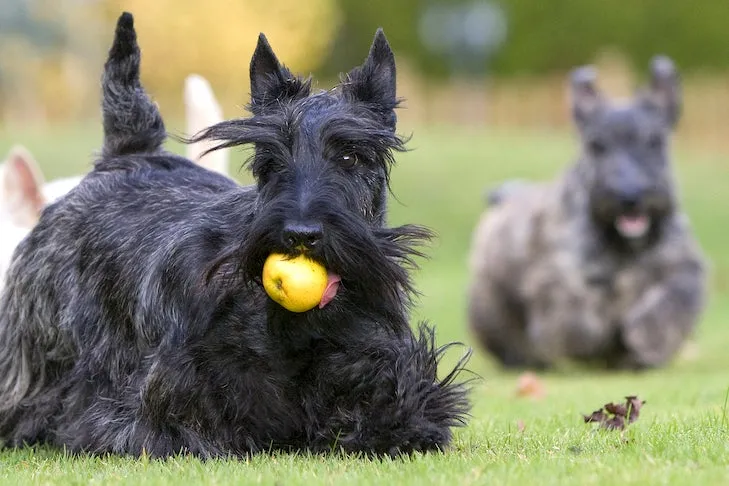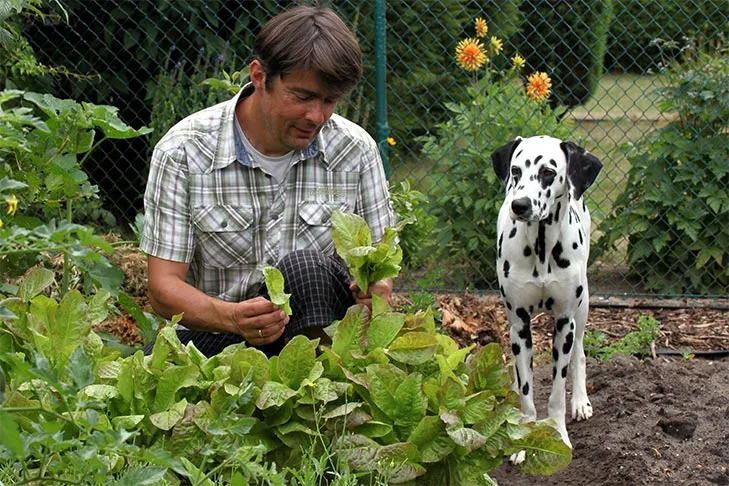It’s natural to want to share your favorite snacks with your beloved canine companion, but a common mistake many pet owners make is assuming that if a food is safe for humans, it’s also safe for dogs. This isn’t always the case. While many human foods are perfectly fine, some can be highly unhealthy or even dangerous for dogs, leading to long-term health problems or, in severe instances, be fatal. Understanding the specific fruits and vegetables dogs can and cannot eat is crucial for their well-being. As omnivores, dogs don’t strictly require fruits or vegetables as a core part of their diet, but certain dog-safe options can be excellent, healthy treats or snacks. For a broader understanding of what constitutes a healthy diet, you might also be interested in exploring what are the best foods for dogs to eat.
This article will guide you through a comprehensive list of fruits and vegetables, detailing which ones are safe to share in moderation and which should be strictly avoided to ensure your dog’s health and happiness.
Fruits Dogs Can Eat
Given in moderation, many fruits can serve as delicious and nutritious treats for dogs, offering a valuable source of essential vitamins, minerals, and antioxidants. These natural snacks can be a great way to add variety to your dog’s diet while providing health benefits.
Apples
Apples are a fantastic source of vitamins A and C, along with fiber, making them a healthy snack for your dog. Their low protein and fat content makes them particularly suitable for senior dogs. Always remove the seeds and core before offering apples, as the seeds contain traces of cyanide. Frozen apple slices can be a refreshing treat on a warm day.
Bananas
Bananas, in moderation, offer a great low-calorie treat for dogs, rich in potassium, vitamins, biotin, fiber, and copper. They are also low in cholesterol and sodium. However, due to their high sugar content, bananas should be given sparingly as an occasional treat rather than a regular part of your dog’s diet.
Blueberries
Blueberries are often considered a superfood, packed with antioxidants that help prevent cell damage in both humans and canines. They are also abundant in fiber and phytochemicals. Their small size makes them an excellent training treat, and they are a popular ingredient in many dog treats, often combined with other healthy components like yogurt.
Cantaloupe
Cantaloupe is brimming with nutrients, low in calories, and an excellent source of water and fiber. However, its high sugar content means it should be offered in moderation, particularly for dogs who are overweight or have diabetes. Freezing small cubes of cantaloupe can create a delightful and hydrating summertime snack for your dog.
Cranberries
Both fresh and dried cranberries are safe for dogs in small quantities. While some dogs might find their tartness unappealing, they offer antioxidants. It’s crucial to exercise moderation to prevent an upset stomach. When choosing dried cranberries, opt for unsweetened versions, as many commercial dried cranberries contain added sugars that dogs don’t need. Unsweetened fresh or frozen cranberries are the best choice.
Cucumbers
Cucumbers are an exceptional treat for dogs, especially those who are overweight, as they contain very few carbohydrates or fats and are largely composed of water, promoting hydration and satiety. They are loaded with vitamins K, C, and B1, along with potassium, copper, magnesium, and biotin. Chilled or frozen cucumber slices make an excellent, refreshing snack during hot weather.
Mango
This sweet, juicy tropical fruit is a powerhouse of vitamins A, B6, C, and E, as well as potassium, beta-carotene, and alpha-carotene. When feeding mango, always remove the hard pit first, as it contains small amounts of cyanide and poses a significant choking hazard. Due to its high sugar content, mango should be an occasional treat, especially for dogs managing their weight.
Oranges
Veterinarians generally consider oranges safe for dogs to eat, though many dogs may be deterred by their strong citrus scent or taste. Oranges are an excellent source of vitamin C, potassium, and fiber. The juicy flesh, offered in small quantities and without seeds, can be a tasty treat. It’s important to discard the orange peel, as its rough texture and oils can upset a dog’s digestive system.
Peaches
Small, cut-up pieces of fresh or frozen peaches are a good source of fiber and vitamin A. Like cherries, peach pits contain cyanide, so it is essential to completely remove all flesh from the pit and dispose of the pit safely. Avoid canned peaches, as they typically come in sugary syrups that are unhealthy for dogs. Frozen peach slices can offer a fun, cooling treat.
Pears
Pears are a beneficial snack for dogs, rich in copper, vitamins C and K, and fiber. When sharing pears, ensure they are cut into bite-sized chunks, and the pit and seeds are removed, as they contain traces of cyanide. Just like peaches, avoid canned or jarred pears with added sugary syrups.
Pineapple
A few chunks of fresh pineapple can be a sweet and healthy treat for dogs, provided the spiky outer peel and hard crown are removed. This tropical fruit is packed with vitamins, minerals, and fiber. It also contains bromelain, an enzyme that aids dogs in absorbing proteins. Always opt for fresh pineapple over canned or packaged versions, which often contain added sugars.
Pumpkin
Pure pumpkin is a highly beneficial food for dogs, renowned for its antioxidant properties. Its most notable superpower is its ability to help relieve both diarrhea and constipation in dogs. When purchasing canned pumpkin, always choose 100% pumpkin puree, avoiding pumpkin pie filling which contains added sugars and spices. Roasting fresh pumpkin and feeding the peeled flesh is another excellent option. You can also find many pumpkin dog treats and supplements.
Raspberries
Raspberries are safe for dogs in moderation and are rich in antioxidants. They are low in sugar and calories but high in fiber, manganese, and vitamin C. Their anti-inflammatory properties make them particularly good for senior dogs, potentially helping with aging joints. However, raspberries contain small, naturally occurring amounts of xylitol, so limit your dog to no more than 8 ounces of fresh or frozen raspberries.
 A playful Scottish Terrier running through lush green grass with its ears up, enjoying the outdoors.
A playful Scottish Terrier running through lush green grass with its ears up, enjoying the outdoors.
Strawberries
Strawberries are full of fiber and vitamin C and also contain an enzyme that can help whiten your dog’s teeth. As with all fruits, strawberries contain natural sugar, so they should be offered in moderation. Frozen strawberries can be a fun and engaging treat for dogs.
Watermelon
Dogs can safely eat watermelon, but it is crucial to remove the rind and seeds first, as these can cause intestinal blockage. The flesh of watermelon is safe and provides vitamins A, B-6, and C, as well as potassium. Composed of 92% water, it’s an excellent choice to help keep your dog hydrated on warm days. Freezing chunks of seeded watermelon makes for a delightful and hydrating summer enrichment treat.
Fruits Dogs Should Avoid
While certain fruits are considered healthy for humans, they may contain compounds, seeds, or parts that are dangerous, or even toxic, for dogs. It’s imperative to keep these particular fruits out of your dog’s reach to safeguard their health.
Avocado
Although avocado is a nutritious snack for humans, it should not be given to dogs. The pit, skin, and leaves of avocado plants contain persin, a toxin that can often cause vomiting and diarrhea in dogs. While the fleshy inside of the fruit has less persin, it can still be too much for a dog’s digestive system to handle. Additionally, avocado flesh is high in fat, which can lead to gastrointestinal upset or contribute to health issues like pancreatitis if consumed in excess.
Cherries
With the exception of the fleshy fruit around the seed, cherry plants contain cyanide and are toxic to dogs. Cyanide interferes with cellular oxygen transport, preventing your dog’s blood cells from receiving enough oxygen. If you have a cherry tree, ensure your dog doesn’t have access to fallen fruit. Symptoms of cyanide poisoning, such as dilated pupils, difficulty breathing, and red gums, require immediate veterinary attention. Always dispose of cherry pits securely in a dog-proof trash can.
Grapes
Grapes and raisins are highly toxic to dogs, regardless of breed, sex, or age, and can lead to acute kidney failure. If you suspect your dog has eaten grapes or raisins, contact your veterinarian immediately. Be vigilant about keeping this dangerous fruit away from your dog, especially if children in your household consume them. Ensure all discarded grapes or raisins are placed in a secure, dog-proof trash bin.
Tomatoes
While the ripened flesh of a tomato fruit is generally considered safe for dogs, the green parts of the tomato plant, including stems and leaves, contain a toxic substance called solanine. Although a dog would typically need to consume a large quantity of the plant to become ill, it’s safer to avoid giving dogs tomatoes altogether. If your dog enjoys exploring your garden, prevent them from accessing tomato plants.
 A Russell Terrier with a humorous expression, sitting next to slices of cucumber on a wooden table, possibly as a healthy snack.
A Russell Terrier with a humorous expression, sitting next to slices of cucumber on a wooden table, possibly as a healthy snack.
Vegetables Dogs Can Eat
Understanding which vegetables are safe for your dog is just as important as knowing which fruits are safe. Many vegetables can offer significant nutritional benefits, contributing to a balanced diet and overall well-being. Here are several vegetables that you can confidently prepare and share with your canine friend. These can be excellent additions to what is good for my dog to eat.
Broccoli
Broccoli is safe for dogs in small amounts and is best served as an occasional treat. It’s high in fiber and vitamin C and low in fat. However, the florets contain isothiocyanates, which can cause mild to potentially severe gastric irritation in some dogs. Tough broccoli stalks have also been known to cause esophageal obstruction. To minimize these risks, it’s advisable to offer cooked broccoli to your dog.
Brussels Sprouts
Brussels sprouts are packed with nutrients and antioxidants beneficial for both humans and dogs. However, moderation is key, as feeding too many can lead to excessive gas in your dog. If your dog enjoys them and you can tolerate the side effects, Brussels sprouts can be a healthy addition to their diet.
Carrots
Carrots are an excellent low-calorie snack, rich in fiber and beta-carotene, which converts to vitamin A. Chewing on this crunchy root vegetable can also be beneficial for your dog’s dental health. Carrots are a common ingredient in many dog foods and treats, making them a well-accepted and healthy option. You might also be interested in what human vegetables can dogs eat for more options.
Celery
In addition to vitamins A, B, and C, celery contains nutrients that promote a healthy heart and may even help fight cancer. An added bonus: celery is known to help freshen doggy breath. It’s a versatile and beneficial vegetable to include in your dog’s occasional treats.
Green Beans
Green beans, whether chopped, steamed, raw, or canned (plain), are safe for dogs. They are rich in important vitamins and minerals, high in fiber, and low in calories. When using canned green beans, always choose no-salt-added versions. Frozen green beans can also serve as enjoyable enrichment snacks. For more ideas on preparation, consider reading about what cooked vegetables are good for dogs.
Peas
Green peas, snow peas, sugar snap peas, and garden or English peas are all acceptable for dogs occasionally. Peas provide several vitamins, minerals, protein, and high fiber content. You can feed your dog fresh or frozen peas, but avoid canned peas due to their high sodium content.
Spinach
Dogs can eat spinach, but it’s not among the top vegetable recommendations for them. Spinach is high in oxalic acid, which can hinder the body’s ability to absorb calcium and potentially lead to kidney damage. While a dog would likely need to consume a very large quantity to experience problems, it might be safer to opt for other vegetables. If you wish to provide the benefits of leafy greens, specific spinach dog treats can be given occasionally.
 A friendly Dalmatian observing a person gardening, curiously watching as leaves are picked from a plant.
A friendly Dalmatian observing a person gardening, curiously watching as leaves are picked from a plant.
Vegetables Dogs Should Avoid
While many vegetables can be a healthy addition to a dog’s diet, certain ones can be toxic or harmful if consumed. Being aware of these particular vegetables and keeping them out of your dog’s bowl is essential for their safety and health.
Asparagus
While asparagus is not inherently unsafe for dogs, there’s little nutritional benefit in feeding it to them. It’s too tough to be eaten raw, and by the time it’s cooked to a soft enough consistency for dogs, much of its nutritional value is lost. If you’re looking to share a vegetable with your dog, there are many other more beneficial options available.
Mushrooms
Wild mushrooms can be highly toxic to dogs. Although only a small percentage of the 50,000 mushroom species worldwide are known to be poisonous, the toxic ones can cause severe illness or even death. Therefore, wild mushrooms should always be avoided. However, washed mushrooms purchased from a reputable supermarket for human consumption are generally fine for dogs in small quantities.
Onions
Dogs should never eat onions. If you suspect your dog has consumed onions, contact your veterinarian immediately. Onions, along with leeks and chives, belong to the Allium family of plants, which are poisonous to most pets, particularly cats. Ingesting onions can cause your dog’s red blood cells to rupture, leading to vomiting, diarrhea, stomach pain, and nausea. Onion poisoning is particularly serious in Japanese breeds like Akitas and Shiba Inus, but all dogs are highly susceptible. Ensure that children do not share foods containing onions with your dog and secure all leftovers out of their reach. This is especially important for specific breeds like what food can a maltese dog eat where dietary sensitivities can be a concern.
Conclusion
Providing a safe and healthy diet for your dog involves carefully considering what fruits and vegetables you share with them. While many fresh produce items offer valuable nutrients and make excellent treats, others pose significant health risks due to toxic compounds or potential choking hazards. Always prioritize your dog’s safety by thoroughly researching any new food before introducing it into their diet, ensuring all seeds, pits, and potentially harmful parts are removed, and offering treats in moderation. When in doubt, consulting with your veterinarian is always the best course of action to ensure your furry friend receives the best possible nutrition and avoids any dangerous foods.
References:
- American Kennel Club (AKC) – various articles on dog nutrition and safe foods.
